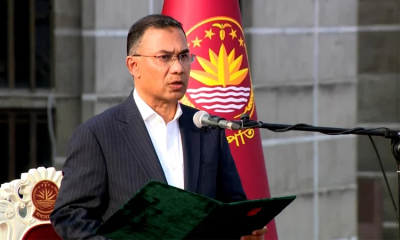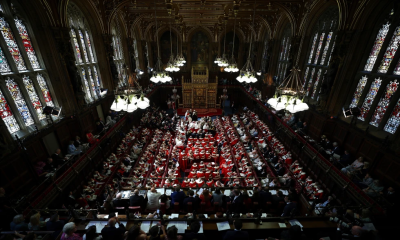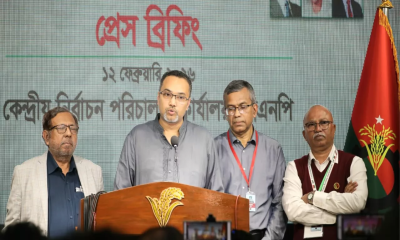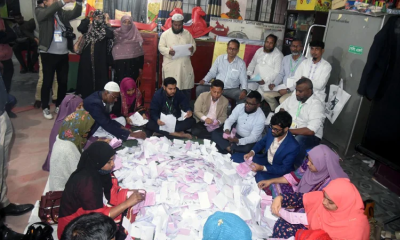Minutes into 26 March 1971, Bangabandhu Sheikh Mujibur Rahman proclaimed the independence of Bangladesh:
This may be my last message. From today Bangladesh is independent. I call upon the people of Bangladesh, wherever you are and with whatever you have, to resist the army of occupation to the last. Your fight must go on until the last soldier of the Pakistan occupation army is expelled from the soil of Bangladesh and final victory is achieved.
On the morning of 26 March, some hours after Bangabandhu Sheikh Mujibur Rahman had been arrested by the Pakistan army following his declaration of Bangladesh's independence, senior generals of the army were seen to be in celebratory mood in Dhaka cantonment. Brigadier Abdul Rahman Siddiqi, chief of Inter-Services Public Relations (ISPR) and press advisor to General Yahya Khan, President of Pakistan and Chief Martial Law Administrator, has recorded the atmosphere prevailing in the cantonment even as the military went on murdering Bangalees across Dhaka.
Here is his report in his book, East Pakistan The Endgame: An Onlooker's Journal 1969-1971:
"The first person I ran into was General Umar. He could not have looked happier. I saluted him. He embraced me and said that he was glad to see me. Generals Hamid and Tikka were breakfasting in the adjoining dining room . . . Hamid entered the drawing room. He looked completely relaxed after a satisfying breakfast. Behind him was Tikka . . .(who) asked me if I had had my breakfast. 'Yes , sir, thanks,' I said.
'All right,' he said, pointing to some oranges on a plate, 'have some of these. They are fresh from West Pakistan."
Across Dhaka, the Pakistan army had already attacked the university and its residential Jagannath Hall and Iqbal Hall. The philosopher GC Dev had already been killed, along with some other academics. Professor Jyotirmoy Guhathakurta, shot but barely alive, struggled for breath and would die within days. At Elephant Road, Commander Moazzam Hossain, who had been an accused in the Agartala Conspiracy Case, was murdered by the army at his residence.
The Central Shaheed Minar was reduced to rubble; and students were killed at Jagannath Hall. Professor Nurul Ula captured on video, from his room at quite a distance, long range images of students being shot by the soldiers. Rickshaw pullers died on their vehicles, pumped by bullets. The orgy of killing which had begun late on 25 March continued apace.
General Yahya Khan and his team were back in Rawalpindi, having stealthily flown out of Dhaka the previous evening and without calling a formal end to the negotiations the junta had been having with Bangabandhu and the Awami League. As fire, resulting from an army assault, consumed the offices of the pro-Awami League newspaper The People in the early minutes of what would degenerate into a genocide, Zulfikar Ali Bhutto watched it all from his suite in Hotel Intercontinental.
In the cantonment, the mood among the officers was one of battlefield triumph. In the outside world, not a word went out of the atrocities being perpetrated in Dhaka. Away from occupied Bangladesh, the expectation was that General Yahya Khan's radio broadcast, scheduled for the evening, would relate to a transfer of power to Sheikh Mujibur Rahman.
That did not happen, as circumstances would show. As Siddiqi notes, Yahya Khan spoke on the radio at 7:15 pm. The generals in the cantonment were happy with what the junta leader had to say. Besides, Siddiqi particularly notes the cheerful way in which Roedad Khan, at the time information secretary in the central government of Pakistan, received Yahya's speech:
"Roedad's face beamed as the president denounced Mujib as a 'traitor' and declared that the man 'would not go unpunished'. 'Yar iman taza hogia (my faith stands revived, he said."
Ironically, in the years since the collapse of Pakistan in Bangladesh, Roedad Khan has been singing a different tune on Pakistani television. Yahya Khan, he has said more than once, should have gone for a political solution to the crisis. He has never contradicted Brigadier Siddiqi's comments on him relating to 26 March 1971.
And then there is Major General Khadim Hussain Raja, who had been informed by Tikka Khan the previous day: "Khadim, it is tonight". The "it" was of course the launch of the genocide under the euphemistic term 'Operation Searchlight'. Raja, whose book A Stranger in My Own Country: East Pakistan 1969-1971 is a posthumous publication (Raja died in 1999), records the following:
"I was instructed to put Operation Searchlight into action on the night between 25 and 26 March 1971. The 'go ahead' signal was given soon after midday on 25 March. This was a momentous decision and I was very sad for the country. The supreme authority had decided to plunge the country into civil strife; the end result was a foregone conclusion."
He goes on to write:
"The President had apparently decided to dump East Pakistan and let it go its own way. He seemed to be concerned about his personal safety only. Therefore, he left Dhaka under some sort of a cover plan at about 7 pm on 25 March, which fooled nobody except, probably, himself."
A good number of Pakistani military officers active in occupied Bangladesh have over the decades come forth with their individual accounts of the crisis in the aftermath of the military action in a soon-to-be independent country.
Brigadier Siddiq Salik, stationed as the Pakistan army's public relations officer in occupied Bangladesh throughout the war, writes of 26 March 1971 in his work Witness to Surrender:
"The gates of hell had been cast open. When the first shot had been fired, 'the voice of Sheikh Mujibur Rehman came faintly through on a wavelength close to that of the official Pakistan Radio. In what must have been, and sounded like, a pre-recorded message, the Sheikh proclaimed East Pakistan to be the People's Republic of Bangladesh.'"
Salik refers here to a report by the British journalist David Loshak.
In the morning on 26 March, the army escorted ZA Bhutto to Tejgaon airport and put him on a flight to Karachi. Arriving in the city, a happy Bhutto made what surely was the understatement of the year.
"Thank God, Pakistan has been saved," he told waiting newsmen.
Bangabandhu Sheikh Mujibur Rahman was lodged at Adamjee College before being clandestinely flown to (West) Pakistan and placed in solitary confinement in a secret location.
His party colleagues -- Tajuddin Ahmad and others -- made their way out of Dhaka and headed for the border with India. In less than a month, a Bangalee government would be formed and a guerrilla army, the Mukti Bahini, would be put in place to battle the Pakistan occupation army.
Tens of thousands of Bengalis -- students, academics, soldiers, lawyers, medical personnel, artistes, political leaders and workers, peasants, civil servants, journalists, lawyers -- would make their way to Mujibnagar to wage the war for liberty.
Postscript:
In his acclaimed work, Ayub Khan: Pakistan's First Military Ruler, Altaf Gauhar notes:
"The struggle of the Bengalis for greater freedom evoked (a) spontaneous response from the smaller provinces of West Pakistan, which were groaning under the yoke of Punjabi and Pathan domination. Toward the end Ayub came to the dismal conclusion that there was nothing to hold the country together except the fear of the Hindu. The best thing, he thought, was to 'let East Pakistan go' and give the other provinces the maximum autonomy they wanted."
The story was published in The Business Standard

















-20260218060047.jpeg)


-20260217073221.webp)















